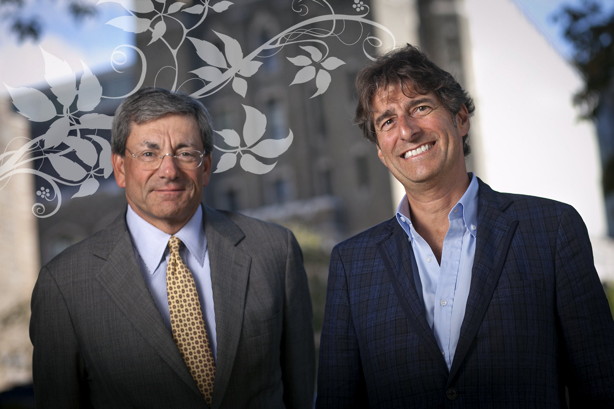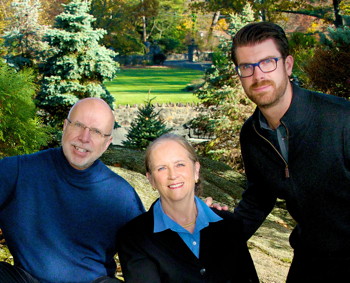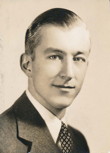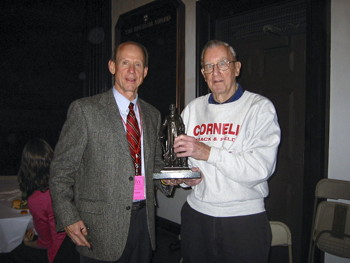CORNELL NOW
Cornell Now--2015

Robert J. Katz '69, left, with Paul Salvatore '81, J.D. '84.
New national chair sets annual fund course
"The annual fund is timeless," says Paul Salvatore '81, J.D. '84, named in July the new national chair for the Cornell Annual Fund. He describes how unrestricted, current-use gifts support the university's perennial priorities and enable Cornell's leaders to respond swiftly to opportunities that emerge season after season.
He offers examples: "A competitive offer to recruit a star faculty member, the extra research funds to buy materials for a new collection in Africana studies, the ability to sponsor a Greek academy to help train sorority and fraternity leaders as Cornell reshapes the Greek system."
A member of the executive committee of the law firm Proskauer Rose, Salvatore has taken on several leadership roles at Cornell. He is a Cornell University trustee, and a member of the Cornell Tech task force and the ILR School and Law School advisory councils. His previous posts include serving as Tower Club co-chair alongside his wife, Pamela, and as Cornell Annual Fund vice chair.
Salvatore succeeds Robert J. Katz '69, senior director at Goldman Sachs and vice chair of the Cornell University Board of Trustees.
"We are extremely grateful for Bob's exceptional leadership," says Joe Lyons '98, director of the Cornell Annual Fund. "He has been a passionate and tireless advocate for unrestricted giving to the university, and he has been an important part of our success over the past eight years."
"Bob's approach is one of proven success," agrees Salvatore, "and I look forward to continuing to make the annual fund an essential part of the philanthropic picture at Cornell."
When Katz first took the reins in 2005, the Cornell Annual Fund raised $12 million yearly. Under his leadership and throughout the ongoing "Cornell Now" campaign, this total has nearly tripled, reaching $33.3 million in fiscal year 2013 with gifts from 34,194 donors – an all-time high in amount and in participation.
According to Katz, the goal was not merely to achieve a surge in numbers but to establish a dependable stream of current-use funds year after year, even long after the 2015 completion of the current campaign. "It's more about building the new 'flow rate' and getting to a new annual fund level and staying there," he emphasizes.
The next target for the Cornell Annual Fund? Reaching $40 million within the next few years.
"Forty million would be equivalent to a billion dollars in endowed funds, given a 4 percent yearly payout of the university's endowment," Katz says. "To transform the annual fund into a billion-dollar asset for a university with an endowment of $5 billion is a very powerful thing."
Salvatore is ready to take on the challenge. "We have the donor base to achieve this aspiration," he says. "So many of Cornell's alumni, parents and friends do so much in terms of philanthropy, and we have more than 260,000 living alumni. With general support and a large alumni base and the level of success that our alumni have had, there's a lot of potential to grow the annual fund as we educate people on why it's so important and what it does."
"I wouldn't be where I am without Cornell," Salvatore says. "Staying connected with the university is exhilarating, and it's just so rewarding to be a part of a community that is at the forefront of so much great work."
"This is an exciting time for the university and the Cornell Annual Fund," he adds. "Our sails are full and the wind is at our back."
McCormicks provide a $5 million leg up
"I had struggled with teaching," admits Susan Daniel, assistant professor of chemical engineering. Daniel, who joined Cornell's faculty in 2007, knew that she wanted to be a more contemporary and inspiring teacher, a teacher who used technology to engage her students in active learning.

From left, James McCormick '69, M.Eng. '70, Marsha McCormick '70 and James McCormick Jr. '05, M.Eng. '06. Photo: provided. See larger image
"But I didn't know how to do what I wanted to do with my class. I didn't have the experience, and I didn't have the budget," she says.
In 2008, the college launched the Teaching Excellence Institute (TEI) and hired its first director, Kathryn Dimiduk '79, a Cornellian with a Ph.D. in applied physics from Stanford and 19 years of college teaching experience.
The results of Dimiduk's consultations with Daniel included the introduction of i-Clickers in Daniel's class (which allow the professor to poll or quiz students at any given moment), Wacom tablets (the instant digitization of the classroom materials and lecture notes), the production of a "virtual tour" video of Daniel's visit to a power plant, and the development of an new class project wherein students were asked to model the human body as a set of chemical processes.
In 2011, the American Society for Engineering Education recognized Daniel, who had once been a lackluster teacher by her own estimation, with an Outstanding Teaching Award.
In addition to working individually with more than 100 professors, the TEI also manages a technology lending library for faculty and conducts midsemester student surveys, which deliver student feedback to professors quickly so adjustments can be made to a class still in progress.
This June, James McCormick '69, M.Eng. '70, and Marsha McCormick '70, longtime supporters of teaching initiatives at the college, made a $5 million gift to endow the institute, making permanent the kind of services that helped Daniel.
James "Jim" McCormick is founder and president of First Manhattan Consulting Group, a banking services consulting firm. He is a member of the Engineering Council, and he and wife Marsha, who met at Cornell, endowed the chair of Cornell's Department of Biomedical Engineering. They are the parents of James McCormick Jr. '05, M.Eng. '06.
The McCormicks' gift will have a profound and lasting impact on engineering at Cornell, says Dean Lance Collins. "Like engineering itself, inspired teaching is an applied science," says Collins. "The James McCormick Family Teaching Excellence Institute gives us the technological tools, the expertise, the coaching and the innovation to engineer courses that are more effective."
Bob Brunet's enduring gifts

Robert Brunet '41 See larger image
A year and a half ago, Robert Brunet '41, a 93-year-old bachelor and World War II veteran with no immediate family, passed away quietly, but his devotion for Cornell resounded in one final hurrah: a surprising bequest of more than $1 million benefiting athletics, the College of Engineering, and other areas of the university he cared most about.
"Every time he called or wrote after making a gift, he would always say, 'I wish it could be more,'" remembers Lou Duesing, the retired head coach for women's track and field and current assistant coach of women's cross country. And he'd often close his letters to Cornell with "P.S. No reply expected."

Robert Brunet '41, right, with Big Red cross country coach Lou Duesing, was recognized as a Foremost Benefactor in 2005. Photo: provided. See larger image
In 2005, Brunet was recognized as a Foremost Benefactor. He'd declined a formal ceremony in Ithaca, but Cornell surprised him with the award and statue at a dinner celebration in Cambridge, Mass. – where he lived in a simple apartment – after the Ivy League Heptagonal Indoor Track & Field Championships.
According to Andy Noel, the MeakemSmith Director of Athletics and Physical Education, Brunet helped to meet the fundraising goals of women's teams for softball, track and field, and ice hockey, year after year. "When his gifts came in, they always raised my spirits and the spirits of the coaching staff and their students."
A portion of Brunet's bequest helped fund the first phase of the ongoing softball field renovation.
– Items written by Emily Sanders Hopkins and Jose Perez Beduya